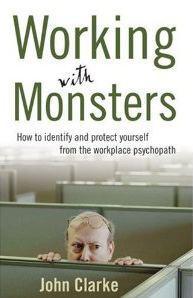The targets for workplace bullying are often different to those of schoolyard bullying although many people, particularly "natural targets" such as aspies, will find themselves victims in both scenarios.
The Corporate HierarchyIf you're the boss at work, you probably don't need to worry about being bullied but if you notice an unusually high staff turnover or if you notice that there are a lot of complaints both by and about specific individuals, you should probably investigate (quietly).
CEOs themselves generally aren't bullies because if they antagonise all of their staff, the company profits will suffer.
Bullies aren't usually to be found in the lower levels of the corporate hierarchy either. Unlike schoolyard bullies, workplace bullies generally don't use greater size or strength advantages (except perhaps in blue-collar roles). Instead, their machinations are primarily political. They can't bring a lot of pressure to bear from the bottom of the organisation, so they're more likely to "suck up" to bosses at this level until they get to a position of relative power.
What can be found in the lower levels of the organisation however are the primary targets of workplace bullying.
Middle and upper management tends to be the natural home of the workplace bully and the greater the control over staff, the better. Bullies tend to be a natural fit in people-centric roles such as human resources, project and office management.
The Tricks of the TradeWorkplace bullying tends to take the following forms;
- Appearance and Manner
Picking on someone because of their dress, jewelery, tattoos, hairstyle or their general manner, such as telephone or meeting conduct. This tends to be an area dominated by female bullies and the aim of the bully is to make the victim feel insecure about themselves and perhaps, to force more conservative trends. This helps older female bullies to retain attention which may otherwise be lost to younger staff. - Ethical Questions
This style of bullying calls the ethics of the victim into question. It's usually targeted on a perceived "weak point" and may question religious beliefs, sexual preferences, business practices, decisions and even parenting abilities.
Bullies attacking someone's ethics will attempt to make their victims feel uneasy (or even resign) by loudly dropping hints that their ethics are somehow wrong. For example; they may suggest in general discussion, that mothers who return to work while their kids are still very young are the worst kind of people. They may pretend to be totally oblivious to the fact that their words are hurting a mother in the office. These parents have enough self-doubt about leaving their babies in the care of strangers without being called out on it by bullies. - Attacks on Knowledge
Many of the most common forms of workplace bullying take place around the idea of knowledge. Workers are accused of being unskilled or otherwise unable to perform their duties. The bully "accidentally" withholds or delays key knowledge, such as reports, emails or system passwords.
In one case from my past, we had a female IT worker who wasn't particularly well accepted by her peers. A male colleague kept reducing her access rights to the point where she would frequently find herself locked out of systems and unable to do her job. Since she was supposed to be an IT support person, this bullying made her seem incompetent.
Bullies who attempt to use knowledge as a weapon will often try to make it seem that the office cannot function without them. They will set things up to fail when they are not around or will redirect phones and email to ensure that they are the only ones who get a chance to operate certain systems. They will complain bitterly about other people not giving them training, documentation or access while resisting efforts to allow others to be trained.
If someone does any part of their job during an absence, they will complain bitterly about the quality of work - even if there was nothing wrong with it - as soon as they return. - Credit Takers
Credit taking bullies are those who attempt to take credit for the work of others while complaining bitterly that they "had to do all of the work themselves". These sorts of bullies will take issue with any reports you submit to upper management without having gone through them first. They will exclude their victims from meetings and will present their victim's documents as their own.
Dealing with Workplace BullyingThere's not a lot you can do about workplace bullying, particularly if the bully either has the CEO's ear or works in the human resources department. In both of these cases, the bully may have high levels of access to your file and will attempt to suppress complaints about themselves. If anything, you'll simply draw attention to yourself.
If the bullying is not impacting you too greatly, then you can continue working and just keep copious, unpublished notes about issues. Save the notes for a time when they are really needed.
If, on the other hand, the bullying is affecting you, then start looking for another job. It's worthwhile reporting it but there's little chance you can win.
 A Good ReadWhile not simply on workplace bullying, the following book is a very interesting read on the subject.
A Good ReadWhile not simply on workplace bullying, the following book is a very interesting read on the subject.Working with Monsters: How to Identify and Protect Yourself from the Workplace Psychopathby John ClarkePublished by: Random House AustraliaISBN-13: 9781740511544Year Published: 2005Australian Online BookshopAmazon
Other Posts in this Series
- Part 1: Bullies and Bullying - An Introduction
- Part 2: The Primary School Bully
- Part 3: The High School Bully
- Part 4: Bullying Outside of School (Tertiary & Social)
- Part 5: The Rise of Cyberbullying

